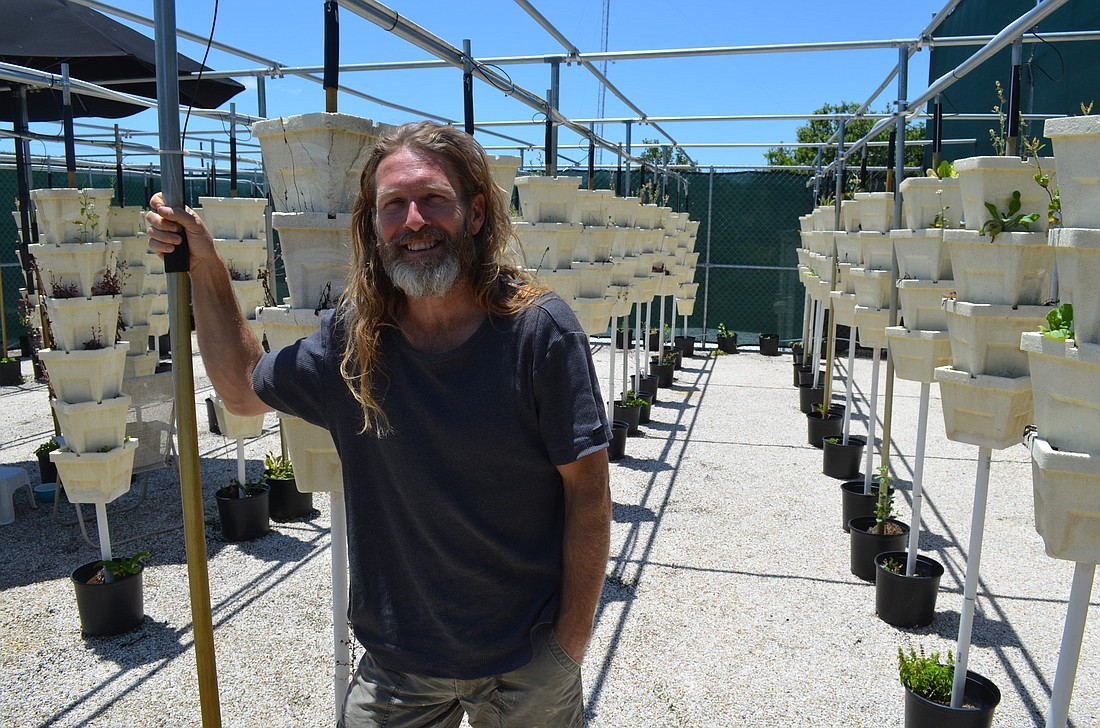- May 7, 2024
-
-
Loading

Loading

Steve McAllister is a local artist, musician and activist, who always has his hands in one project or another.
He’s lived without money, traveled the country as a homeless person and helped form the alternative currency system, called the Common Wealth Time Bank in Sarasota. Most recently, he’s coined the term “reverse panhandling,” and is in the process of developing his Flow Factory, which he hopes will support healthy living and community development.
Where are you from, originally?
I was born in Sarasota, so I’m a native, but I’ve been to about 44 of the states for at least some period of time.
What about Sarasota drew you back?
Of all the places I’ve been, it had the most of what I want to be comfortable. It’s near the water, which I’ve always found important. It’s healing and life sustaining, and it feeds me, creatively. I also enjoy Sarasota’s celebration of the arts, and I like the community.
You always seem to have a lot of ongoing projects. How would you describe yourself?
I would say I’m a Renaissance man. Essentially, I’m a writer, and that’s what I find most empowering. But, I try to be a complete person, and at this point in time, we all sort of need to be Renaissance people. We’re going through a shift, and nobody can really just do one job, anymore.
You lead a different type of lifestyle than many people are used to. Have you always been this way?
I’ve always been a little different. I’ve prided myself in being able to do many different jobs. I’ve been a Disney puppeteer, a taxi driver, a stunt man, an actor and a production assistant at a winery. There came a point when I realized it wasn’t just me who was having financial issues; it was something we all were dealing with, as a country. So, I allowed myself to be malleable. Money isn’t essential to life. It’s one tool we can use, but there’s so much more.
What is the biggest local issue in which you’re interested?
Lately, it’s been the homeless issue. When we’re called the unfriendliest city to homeless people, that doesn’t sit well with me. I was raised with religion, and I have a reverence for the gospel. I think it’s important we care for those people, and as a community, I feel we’ve fallen short.
How would you like to see the issue addressed?
For a lot of these people, there is a lot of limitation and an inability to participate in life. They need opportunities. I want to use my space to facilitate classes and teach people trades and different ways to do things. I’d love to teach them to grow seedlings here, which, in turn, they can sell, instead of panhandling. I want to empower people.
You spent a period of time living without money or a home. How did that influence you?
In the summer of 2011, I decided I didn’t want to use money anymore. We started Transition Sarasota and the Common Wealth Time Bank to create an alternative currency. Today, there are 260 members.
How does a time bank work?
Instead of money, time is your currency. Donating an hour of service earns you one time dollar, which you can exchange for other services. It builds a stronger sense of community, too. I like not using money. It’s more fun.
How have people responded to the Common Wealth Time Bank?
So far, people have liked the ideas, but we’ll have to see how it plays out in the real world.
Recently, you began something you call “reverse panhandling.” What is it, exactly, and where did the idea come from?
The idea came from a few places, actually. It was sort of inspired by Bob Dylan’s video for “Subterranean Homesick Blues.” But, panhandling has been a big issue here lately. I tried it once when I was in California, and it’s a miserable job. There are a lot of better ways to make money than to panhandle. I would never do it for money, but I thought I could do something fun and expressive with it. So instead of asking for money, I wrote positive messages on signs and gave people something. It put a lot of smiles on people’s faces.
Describe your perfect Sarasota.
I’d like to see people eating a lot more local food and our local artists sharing ideas. I think we could reignite our circus heritage that way. Mostly I’d like to see people move past the politics they’ve been mired down in, and I’d like to see more consensuses among people.